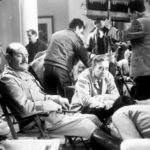Hollywood has attempted, once rather expensively, to tell us what happened on His Majesty’s warship Bounty in 1789. History books have joined Hollywood enthusiastically, making of Captain Bligh a kind of sea-monster – perfect casting for Mr Charles Laughton, who looked like one. Laughton’s Bligh (and Dirk Bogarde’s First Lieutenant in the movie HMS Defiant) are enough to stop all British naval recruitment dead in its tracks.
What happened was this: while sailing on Admiralty business near the Tongan Islands, the crew of the frigate mutinied (a capital crime in all navies), led by one Fletcher Christian (played by saintly Marlon Brando or bibulous Richard Harris in film versions of this sad story). The sailors claimed that their captain treated them badly, flogging them all the time and insulting their mothers and so on, and that they would not have it any more. At least 12,000 miles away from the Admiralty, they might have thought they would get away with it.
Captain Bligh, most of his officers, and some of the remaining crew who had stayed loyal – eighteen men all told, were cast adrift from the warship in an open boat in the Pacific. One must assume that Christian and the other mutineers expected no-one to survive. To help matters along, they gave Bligh water but no chart.
When the ex-Royal Naval ship sailed away under the new captaincy of Fletcher Christian, the crew joyously prayed for a lovely South Sea island, where they could enjoy the local fishing, talent, native music and customs (except cannibalism). They duly forgot about Captain Bligh and his eighteen men. Their mistake, because Bligh sailed without a chart, using the sun, moon and stars at night for navigation, no less than 5,822 kilometres (approximately 3,618 miles), landing at Timor.
Let us make no bones about it; Captain Bligh might have been a martinet, but he wasn’t a jonah. He was a first-class seaman who achieved a miraculous exercise in navigation. Even Mr. A Pérez-Reverte, a first-class seaman also, and no friend of Britain’s, has admitted that Bligh’s voyage in an open boat was a stupendous achievement. Bligh also got back to the Admiralty (eventually) where he reported in full what had happened at the Court Martial convened to find out why he had lost his ship and most of his crew. He was exonerated, but the mutinous crew was not.
The Navy sought out the crew, and found some, who were dealt with by another Court Martial. Fletcher Christian and his mates found Pitcairn Island in 1790, where they got on well with the surprised natives, so well that many tars married the local girls, finally settling down to Pacific life. Their descendents still live in Pitcairn, and Norfolk Island, where the new generation moved to in 1856. There are plenty of Christians in Norfolk Island.










Leave A Comment